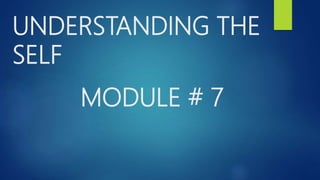
Living With Purpose - Personal Value and Philosophy of Life
- 2. LIVING WITH PURPOSE – PERSONAL VALUE AND PHILOSOPHY OF LIFE MORALITY MORAL REASONING PARENTING STYLES AND PRACTICES
- 3. MORALITY Moral is related to the sense or a standard that determines what is right and what is wrong. Morality refers to the system of beliefs and values that ensures that individuals will keep their obligations to others in the society and behave in ways that do not interfere with the rights and interests of others. Dilemma is a problematic situation in which a difficult choice must be made.
- 4. MORALITY An individual who has a good sense of what is right and wrong will be an honest and upright member of the community.
- 5. MORAL REASONING Moral reasoning • refers to the judgments people make about what courses of action are correct and incorrect in particular situations.
- 6. PIAGET’S STAGES OF INTELLECTUAL DEVELOPMENT: Sensorimotor stage • the child learns and develops knowledge about his/her environment by relating sensory experiences to motor actions. Preoperational stage • the child learns to use symbols like words or mental images to solve simple problems.
- 7. PIAGET’S STAGES OF INTELLECTUAL DEVELOPMENT: Concrete operations stage • the child develops the ability to perform a number of logical operations on concrete objects that are present. Formal operations stage • the individual acquires the ability to solve abstract problems in a logical manner.
- 8. KOHLBERG’S STAGES OF MORAL REASONING: LEVEL STAGE REASON FOR MORAL BEHAVIOR Pre-conventional morality Pleasure / Pain orientation To avoid pain, punishment or getting caught Cost-benefit orientation; reciprocity To get rewards
- 9. KOHLBERG’S STAGES OF MORAL REASONING: LEVEL STAGE REASON FOR MORAL BEHAVIOR Conventional morality Good child orientation To gain acceptance and avoid disapproval Law and order orientation To follow rules and avoid censure by authorities
- 10. KOHLBERG’S STAGES OF MORAL REASONING: LEVEL STAGE REASON FOR MORAL BEHAVIOR Principled or Post conventional morality Social contract orientation To promote the welfare of society Ethical principle orientation To achieve justice and avoid self-condemnation Cosmic orientation To be true to universal principles and feel oneself to be part of a cosmic direction that transcends social norms
- 11. MORALITY In situations in which you need to decide in what you think is a noble cause, but which might put you at a disadvantage, you have to accept the consequence of that choice. At times you might be place in a dilemma which requires you to make a decision, you first have to harness your intellectual capacity and reasoning ability in choosing what “best” decision to take.
- 12. MORALITY When you are at the crossroads of making a decision, always go back to your goals and your philosophy in life as your guide.
- 13. PARENTING STYLES AND PRACTICES Environmental influence •is characterized by forces outside of the individual like how he/she has been raised or reared by his/her parents.
- 14. Parenting styles according to Diana Baumrind: Authoritarian parents • attempt to shape, control, and evaluate the behavior and attitudes of their children in accordance with an absolute set of conduct standards that usually comes from religious or respected authorities.
- 15. Parenting styles according to Diana Baumrind: Authoritative parents •direct their children’s activities in a rational and intelligent way.
- 16. Parenting styles according to Diana Baumrind: Permissive parents •are less controlling and behave with an accepting and non-punishing attitude towards their children’s desires, actions, and impulses.
- 17. Parenting styles according to Maccoby & Martin : Uninvolved or neglectful parents •who take on a “hands-off” stand in the affairs of their children.
- 18. Effects of parenting styles: Authoritarian parents • their children have less behavioral problems which are easily prevented. • studies show that children reared under autocratic parents tend to become withdrawn, fearful, and dependent.
- 19. Effects of parenting styles: Authoritative parents •have children who are independent, reliable, rationale, and confident. •These children generally feel good about themselves.
- 20. Effects of parenting styles: Permissive parents • rarely impose rules and are non-punishing. • they tend to have children who do not put structure and order in things that they do.
- 21. Effects of parenting styles: Uninvolved or neglectful parents •are detached and indifferent to the needs of their children. •children grow up feeling unloved and cannot follow instructions.
- 22. THE END THANK VERY MUCH FOR LISTENING